- Faculty News
- Student News
- Lab News
- Publications
- Meetings and Presentations
- Outreach
- Grants
- Announcements
- About This Newsletter
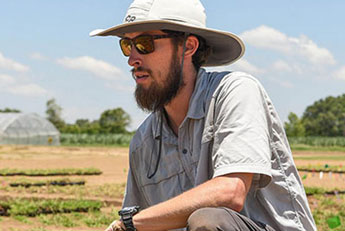
ABOVE: Dr. Jack Payne showcased Dr. Adam Dale in the news: Modest investment leads to big impact in pinpointing magic turf mix.
Dr. Christine W. Miller served as a co-organizer and facilitator at the day-long Weaving the Future of Animal Behavior workshop held at the Animal Behavior Society annual meeting in Chicago, IL in July. The major goals of this NSF-funded workshop are to help postdoctoral researchers and new faculty develop a robust professional network, strategies for building a research group and research program, and time management.

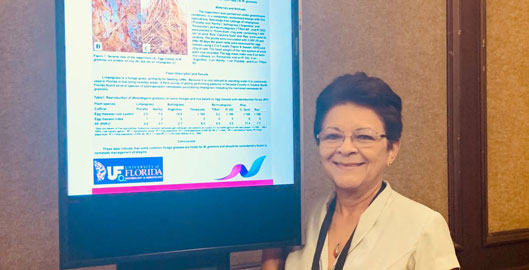
ABOVE: Dr. Maria Mendes was elected Secretary of the Organization of Nematologists of Tropical America (ONTA). She was installed at the ONTA meeting July 21-25 in San Jose, Costa Rica. At the meeting she also presented her poster “Reproduction of Meloidogyne graminis on some common forage grasses in Florida.”
 Dr. Christine W. Miller’s career in entomology was highlighted in Cool Jobs: Entomologist published in Boys’ Life Magazine in July.
Dr. Christine W. Miller’s career in entomology was highlighted in Cool Jobs: Entomologist published in Boys’ Life Magazine in July.
 Invasive Ant Boot Camp 2019 took place in Gainesville, July 22-24. The intensive three-day workshop focused on the identification, ecology and management of exotic ants. We heard from a range of experts on these topics, including our own Dr. Faith Oi, Dr. Roberto Pereira, Dr. Liz Pereira, Jason Williams, and Lyle Buss. Many thanks to these guest lecturers, as well as to special guests Dr. Doug Booher from the University of Illinois/Chicago Field Museum, Dina Libowitz from the UF Field and Fork Garden, and Bart Schutzman from UF Environmental Horticulture. Mark your calendar for next year’s course, which will run June 22-24, 2020. For more information see www.invasiveantbootcamp.org or contact Dr. Andrea Lucky at alucky@ufl.edu.
Invasive Ant Boot Camp 2019 took place in Gainesville, July 22-24. The intensive three-day workshop focused on the identification, ecology and management of exotic ants. We heard from a range of experts on these topics, including our own Dr. Faith Oi, Dr. Roberto Pereira, Dr. Liz Pereira, Jason Williams, and Lyle Buss. Many thanks to these guest lecturers, as well as to special guests Dr. Doug Booher from the University of Illinois/Chicago Field Museum, Dina Libowitz from the UF Field and Fork Garden, and Bart Schutzman from UF Environmental Horticulture. Mark your calendar for next year’s course, which will run June 22-24, 2020. For more information see www.invasiveantbootcamp.org or contact Dr. Andrea Lucky at alucky@ufl.edu.
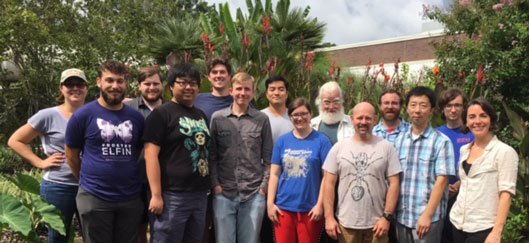
ABOVE: Invasive Ant Boot Camp 2019 participants: Back row from L: Rachel Atchison, Luke Spenik, Kevin Cusak, Leo Ohyama, Kevin McCloskey, Andy Boring, Matthew Miller.
Front row from L: Jacob Hornfeldt, Miles Zhang, Jason Williams, Anaïs Chanson, Doug Booher, Hua Yan, Andrea Lucky.
Photo by Lisa Taylor.
 Dr. James P. Cuda was a invited lecturer for an undergraduate course titled Research and Creativity at UF (HUM 2930) on July 9. The course highlights the role of creativity in research and helps prepare students with some basic skills to be successful in undergraduate research experiences while at UF. In total, 50 first year students attended the lecture.
Dr. James P. Cuda was a invited lecturer for an undergraduate course titled Research and Creativity at UF (HUM 2930) on July 9. The course highlights the role of creativity in research and helps prepare students with some basic skills to be successful in undergraduate research experiences while at UF. In total, 50 first year students attended the lecture.
We wish the best to our summer, 2019 graduates!
Earning their Ph.D. degrees this summer are:
Dr. Christopher Bibbs
Dr. Ruhiyyih Dyrdahl-Young
Graduating with M.S. degrees are:
Jessica Baldwin, Randy Buckley, Wilfrid Calvin, Donald Foster, Alexander Gannon, Johnalyn Gordon, Zachary Kaplan, Jacob Mellick, Eleanor Phillips, Hannah Talton, and Richard West.
BS degree recipients are:
Lauren Hagarty, Kylie Lennon, Britton Simkins, and Collin Torres.
We are proud of all of our graduates!
 Shova Mishra, a Ph.D. student in the DiGennaro Lab was awarded the William C. and Bertha M. Cornett Fellowship as part of the 2019-2020 CALS Scholarship on the basis of scholarship, leadership, professional potential, research focus.
Shova Mishra, a Ph.D. student in the DiGennaro Lab was awarded the William C. and Bertha M. Cornett Fellowship as part of the 2019-2020 CALS Scholarship on the basis of scholarship, leadership, professional potential, research focus.
 Ms. Tamsin Woodman has recently joined the laboratory of Dr. Christine Miller to work on nutritional effects on biomechanics, using hemipterans. Tamsin is an undergraduate intern from the University of Manchester in the United Kingdom, where she is working towards her Bachelors degree in Genetics. This intensive research experience in our department will count towards her University degree. She will be here until April 2020. Please extend to her a warm welcome!
Ms. Tamsin Woodman has recently joined the laboratory of Dr. Christine Miller to work on nutritional effects on biomechanics, using hemipterans. Tamsin is an undergraduate intern from the University of Manchester in the United Kingdom, where she is working towards her Bachelors degree in Genetics. This intensive research experience in our department will count towards her University degree. She will be here until April 2020. Please extend to her a warm welcome!
 Hannah Talton, M.S. student, in the Liburd Lab, successfully defended her Master’s thesis on July 5th, titled “Assessing cultural practices, injury, and, susceptibility of selected strawberry cultivars to the strawberry seed bug (Neopamera bilobata Say) in organic strawberry production.” She presented her paper in this year’s FES. Hannah will continue to pursue a Doctor of Plant Medicine this fall under the supervision of Dr. Amanda Hodges. We are proud of Hannah for her accomplishments!
Hannah Talton, M.S. student, in the Liburd Lab, successfully defended her Master’s thesis on July 5th, titled “Assessing cultural practices, injury, and, susceptibility of selected strawberry cultivars to the strawberry seed bug (Neopamera bilobata Say) in organic strawberry production.” She presented her paper in this year’s FES. Hannah will continue to pursue a Doctor of Plant Medicine this fall under the supervision of Dr. Amanda Hodges. We are proud of Hannah for her accomplishments!
Gabrielle LaTora, in the Liburd Lab, successfully proposed her Masters research on July 25, titled “Innovations in spotted wing Drosophila (Drosophila suzuki Matsumura) monitoring and attract-and-kill for development of more targeted IPM programs.”
 Matthew Pileggi (M.S. student in the Wong Lab) won the third place in oral competition at the Florida Entomological Society (FES) meeting.
Matthew Pileggi (M.S. student in the Wong Lab) won the third place in oral competition at the Florida Entomological Society (FES) meeting.
Welcome to Runhang Shu, a new Master student at the Wong lab.
Need to name that bug? A host of experts are available to help Floridians identify any insect or related arthropod. If a mystery creature has six or more legs, the UF Insect ID Lab is the place to call.
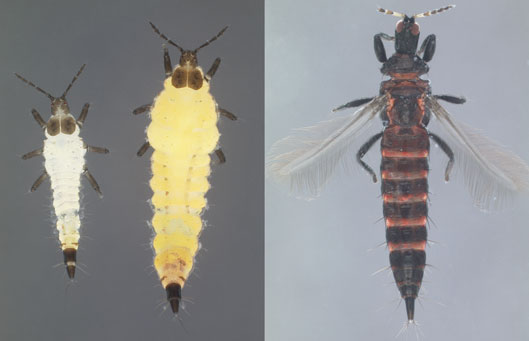
ABOVE: The first of two insects that were studied for biological control of Brazilian peppertree Schinus terebinthifolia in Florida was released jointly by UF and USDA on July 16. The release of the thrips Pseudophilothrips ichini is a significant milestone in invasive plant management for Florida as this represents a culmination of over 20 years of overseas and domestic research biological control of Brazilian peppertree.
If you need insect images for a publication or presentation for your UF/IFAS Extension or teaching work, you can go to this direct link, pictures are copyrighted material and intended for official UF use only. Log onto the website using your Gatorlink credentials.
Lyle Buss is the UF/IFAS Insect ID Lab manager.
 Think it might be a nematode problem? The Nematode Assay Laboratory serves Florida and other states by providing nematode assays and expert advice regarding nematode management.
Think it might be a nematode problem? The Nematode Assay Laboratory serves Florida and other states by providing nematode assays and expert advice regarding nematode management.
For more information on the Nematode Assay Laboratory, please contact the lab manager Dr. Billy Crow.
Borden MA, Dale AG. 2019. Managing Plant Pests with Soaps. EDIS Publication ENY344. UF/IFAS Extension. http://edis.ifas.ufl.edu/in1248.
Cooper WR, Horton DR, Wildung MR, Jensen AS, Thinakaran J, Rendon D, Nottingham LB, Beers EH, Wohleb CH, Hall DG, Stelinski LL. 2019. Host and non-host “whistle stops” for psyllids: Molecular gut content analysis by high-throughput sequencing reveals landscape-level movements of Psylloidea (Hemiptera). Environmental Entomology. 48: 554-566.
Erram D, Blosser EM, Burkett-Cadena N. 2019. Habitat associations of Culicoides species (Diptera: Ceratopogonidae) abundant on a commercial cervid farm in Florida, USA. Parasites & Vectors. 12(1): 367. https://doi.org/10.1186/s13071-019-3626-1.
Glushakova LG, Alto BW, Kim M-S, Hutter D, Bradley A, Bradley KM, Burkett-Cadena ND, Benner SA. 2019. Multiplexed kit based on Luminex technology and achievements in synthetic biology discriminates Zika, chikungunya, and dengue viruses in mosquitoes. BMC Infectious Diseases. 19(1): 418.
Honório NA, Wiggins K, Eastmond B, Câmara DCP, Alto BW. 2019. Chikungunya virus competency of Brazilian and Florida mosquito vectors. Viruses. 11(4): 353.
Juliano SA, Yee DA, Alto BW, Reiskind MH. 2019. Papers from a workshop on mosquito ecology and evolution inspired by the career of L. Philip Lounibos. Journal of Medical Entomology. 56(2): 299-302.
Miller CW, Joseph PN, Kilner RM, Emberts Z. 2019 A weapons–testes trade-off in males is amplified in female traits. Proceedings of the Royal Society B: Biological Sciences. 286: 20190906. http://dx.doi.org/10.1098/rspb.2019.0906.
Parker C, Garcia F, Menocal O, Jeer D Alto BW. 2019. Container prevalence and association with various factors: A pilot mosquito educational campaign in San Pedro Sula, Honduras. International Journal of Environmental Research and Public Health. 16(13): 2399.
Reeves LE, Hoyer I, Acevedo C, Burkett-Cadena ND. 2019. Host associations of Culex (Melanoconion) atratus (Diptera: Culicidae) and Culex (Melanoconion) pilosus from Florida, USA. Insects. 10(8): 239. https://doi.org/10.3390/insects10080239.
Shi Q, George J, Krystel J, Zhang S, Lapointe SL, Stelinski LL, Stover E. 2019. Hexaacetyl-chitohexaose, a chiton-derived oligosaccharide, transiently activates citrus defense and alters the feeding behavior of Asian citrus psyllid. Horticulture Research. 6: 76. doi.org/10.1038/s41438-019-0158-y.
Stelinski LL 2019. Ecological aspects of the vector-borne bacterial disease, citrus greening (Huanglongbing): Dispersal and host use by Asian citrus psyllid, Diaphorina citri Kuwayama. Insects. 10: 208; doi.org/10.3390/insects10070208
Zimler R, Alto BW. 2019. Differential susceptibility to infection and transmission by two Florida mosquito vectors of Zika virus, a dose-response study. Journal of Medical Entomology. 56(2): 341-346.
Zhao L, Alto BW, Shin D. 2019. Transcriptional profile of Aedes aegypti leucine-rich repeat proteins in response to Zika and chikungunya viruses. International Journal of Molecular Sciences. 20(3): 615.
 New on Featured Creatures:
New on Featured Creatures:
Common backswimmer, Notonecta glauca (L). Authors: Taryn B. Griffith and Jennifer L. Gillett-Kaufman.
Giant resin bee, Megachile sculpturalis (Smith). Authors: Kristen C. Stevens, Cameron J. Jack, and James D. Ellis.
Brazilian peppertree thrips, Pseudophilothrips ichini (Hood). Authors: Patricia Prade, Carey R. Minteer, and James P. Cuda.
Do you have a favorite creature? Learn how to make it into a Featured Creatures!
Florida Nematologists in Costa Rica!
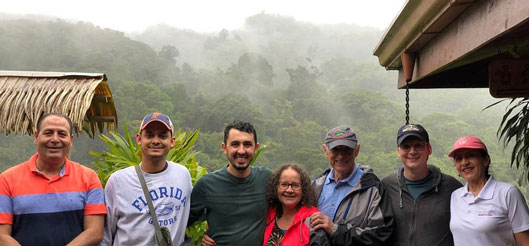
ABOVE: A strong group of faculty and students from the University of Florida’s Entomology and Nematology Department participated in the 2019 Annual ONTA (Organization of Nematologists of Tropical America) meeting in San Jose, Costa Rica! There was a particularly good representation on behalf of the Vegetable and Fruit Nematology Laboratory under Dr. Johan Desaeger’s guidance at the Gulf Coast REC in Balm, FL. In total four presentations were delivered by post-doc Dr. Tristan Watson, Ph.D. Student Clemen de Oliveira (2nd place poster competition), MS Student David Moreira (Student Travel Award Recipient) and the PI Dr. Johan Desaeger. Included was also the participation of gator nematologists: Dr. Joseph Noling, Dr. Larry Duncan, Dr. Maria Mendes and Ph.D. Student Rebeca Sandoval!
![]() Four members of the Miller Lab presented their work at the 2019 Behaviour Conference in Chicago. Ginny Greenway and Zach Emberts gave talks, while Lauren Cirino and Daniela Wilner gave poster presentations. Ginny presented on polyandry in squash bugs, Zach discussed ways in which bugs can evade predation, Lauren presented on the implications of weapon damage on mating success, and Daniela explained how brief nutritional deprivation can influence reproduction.
Four members of the Miller Lab presented their work at the 2019 Behaviour Conference in Chicago. Ginny Greenway and Zach Emberts gave talks, while Lauren Cirino and Daniela Wilner gave poster presentations. Ginny presented on polyandry in squash bugs, Zach discussed ways in which bugs can evade predation, Lauren presented on the implications of weapon damage on mating success, and Daniela explained how brief nutritional deprivation can influence reproduction.
![]() Dr. James P. Cuda was an invited speaker for the Biological Control of Weeds Symposium at the Florida Entomological Society meeting held in Jupiter, FL, 21-24 July. Cuda gave a presentation titled, “Orseolia javanica (Diptera: Cecidomyiidae), a potential biological control agent for the invasive cogongrass, Imperata cylindrica.”
Dr. James P. Cuda was an invited speaker for the Biological Control of Weeds Symposium at the Florida Entomological Society meeting held in Jupiter, FL, 21-24 July. Cuda gave a presentation titled, “Orseolia javanica (Diptera: Cecidomyiidae), a potential biological control agent for the invasive cogongrass, Imperata cylindrica.”
Dr. James P. Cuda was a co-author on a presentation at the 2019 Annual Meeting of the Entomological Society of South Africa held in Durban, SA, 8-11 July. The presentation by graduate student Megan K. Reid was titled “Surveys for potential biological control agents for Nymphaea mexicana Zuccarini.”
![]() Dr. Jacqueline Miller and Dr. Deborah Matthews attend the 68th Annual Meeting of the Lepidopterists’ Society at University of California, Davis, and presented a paper on "The Deception, Thievery, and Mutualism in the Orchid-Insect World." They also visited and did research at the Bohart Museum of Entomology.
Dr. Jacqueline Miller and Dr. Deborah Matthews attend the 68th Annual Meeting of the Lepidopterists’ Society at University of California, Davis, and presented a paper on "The Deception, Thievery, and Mutualism in the Orchid-Insect World." They also visited and did research at the Bohart Museum of Entomology.
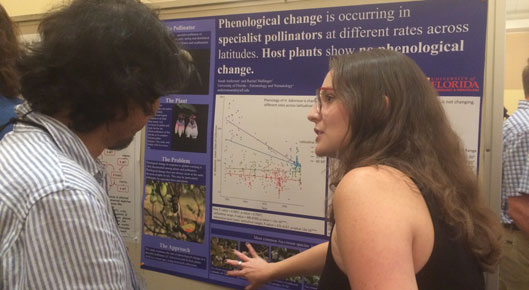
ABOVE: Dr. Rachel Mallinger and graduate students Sarah Anderson, James Weaver, and John Ternest attended the 4th International Pollinator Conference in Davis, CA from July 17-20. They presented three posters from work in the lab titled “Competition between managed honey bees and wild bees within natural landscapes in Florida” (presented by James Weaver), “Plant drought stress alters floral volatile emissions, and reduces nectar rewards, pollinator attraction, and plant reproductive success” (presented by Dr. Rachel Mallinger), and “Phenological change is occurring in specialist pollinators at different rates across latitudes” (presented by Sarah Anderson). John Ternest also presented work from his Master’s research titled “Intensive insecticide-based pest management negatively impacts the diversity of watermelon pollinators.”
Dr. Rachel Mallinger was an invited speaker for the UF Garden Club Short Course on June 10 in Gainesville, FL. She also presented to the Ixia chapter of the Florida Native Plant Society on June 18 in Jacksonville, FL. Members of the Garden Club and the Florida Native Plant Society learned how to better garden and landscape for wild bees.
Sarah Anderson, graduate student in the Mallinger Lab, presented to a large group of beekeepers at the Pinellas County Beekeepers Association Meeting on June 27. She taught them about our other native wild bees, and their role in pollinating both crops and wild plants.
![]() Dr. Oscar Liburd gave an invited presentation titled Practical Pest Management Options for Muscadine Grapes on July 16, 2019 at the annual grape meeting in Citra Florida.
Dr. Oscar Liburd gave an invited presentation titled Practical Pest Management Options for Muscadine Grapes on July 16, 2019 at the annual grape meeting in Citra Florida.
![]() Members of the Liburd Small Fruit and Vegetable IPM Lab presented several papers in the 2019 Florida Entomological Society Annual Meeting:
Members of the Liburd Small Fruit and Vegetable IPM Lab presented several papers in the 2019 Florida Entomological Society Annual Meeting:
Dr. Oscar E. Liburd, Professor & IFAS-Term Prof. of Fruit and Vegetable Entomology, presented the “Effects of bio-rational insecticide on Amblyseius swirskii in organic squash.”
Dr. Nupur Sarkar, Postdoctoral research associate, presented a poster on the “Effects of reduced-risk pesticides on Aphis illinoisensis and its natural enemies, Lysiphlebus testaceipes and Orius insidiosus in muscadine grapes.”
Dr. Deepak Shrestha, Post doctoral research associate, presented the “Evaluation of different release methods and cultivars with the predatory mite, Amblyseius swirskii Athias-Henriot (Acari: Phytoseiidae) to manage the whitefly [Bemisia tabaci (Gennadius) MEAM1] in organic squash.”
Dr. Elena M. Rhodes, biological scientist, presented the “Movement and spatial distribution of spotted wing drosophila, Drosophila suzukii, in organic strawberries in Florida.”
![]() Dr. Adam Dale and Dr. Billy Crow presented “Insect management on turf” and “Nematode management on turf” respectively, at an event Turfgrass In-Service Training: Pest Management. The event was held at the Suntree Country Club in Brevard County, FL on July 30.
Dr. Adam Dale and Dr. Billy Crow presented “Insect management on turf” and “Nematode management on turf” respectively, at an event Turfgrass In-Service Training: Pest Management. The event was held at the Suntree Country Club in Brevard County, FL on July 30.
![]() News from Society of Nematologists meeting in Raleigh NC July 7 to 19.
News from Society of Nematologists meeting in Raleigh NC July 7 to 19.
Presentations by our faculty, staff, and students:
Alake G, Timper P, Wright DL, Duncan LW, Crow WT, Alborn HT, Mekete T, DiGennaro P. Structural composition of soil communities do not shift based on nematode management method.
Baniya A, Duncan LW, DiGennaro P. Comparative genomics of native steinernematides and associated bacterial symbionts from Florida citrus groves.
Coburn J, Desaeger J. Host status of different hemp (Cannabis sativa L.) cultivars for root-knot nematode (Meloidogyne javanica).
Crow WT. Lance nematodes, an increasing problem on golf course in the southeastern United States.
Desaeger J, Watson T, Coburne J. Nematicide cocktails for improved efficacy in Florida strawberries.
DiGennaro P, Hu W, Dryrdahl-Young T. The problem with biological controls.
Dritsoulas A, Campos-Herrera R, Duncan LW. Assessing the biogeography of entomopathogenic nematodes using metabarcoding.
Filgueiras CC, Duncan LW, Dickson DW, Willett DS. Plant defense pathways mediate plant-insect-nematode interactions.
Grabau Z, Schumacher LA, Sandoval-Ruiz R, Liao H, Small I, Wright DL. Looking below the surface: Do different cropping systems affect the nematode community below the plow layer.
Gu M, Crow WT. Metabolites that may explain antagonism between Belonolaimus longicaudatus infested bermudagrass and Pythium arrhenomanes.
Habteweld A, Mendes ML, Crow WT. First report of root-knot nematode Meloidogyne javanica infecting giant bamboo (Dendrocalamus asper) in Florida.
Hu W, DiGennaro PM. Identification of suitable Meloidogyne spp. housekeeping genes.
Khanal C, Regmi H, Desaeger J. Employment of thermotherapy for non-chemical management of nematodes of strawberry transplants.
Liu C, Grabau ZJ, Navia Gine PA. Nematode management in Florida potato and sweet potato using non-fumigant nematicides.
Mendes ML, Dickson DW, Crow WT. Host status of yellow and purple nutsedge to Belonolaimus longicaudatus.
Mishra S, DiGennaro PM. Role of circadian rhythms on root-knot nematode parasitism.
Mishra S, DiGennaro PM. Transcriptional profiling of root-knot nematode feeding sites over a 24 hour period.
Noling J, Baggio JS, Peres NA. Incidence, severity, and crop impacts in Florida strawberry.
Noling J, Desaeger J. Evaluation of fumigant and non-fumigant nematode management strategies in Florida strawberry 2018-2019.
Regmi H, Abdelsamad N, Khanal C, DiGennaro P, Desaefer J. Potential of adenine dinucleotide (NAD) for management of root-knot nematode in tomato.
Schumacher L, Grabau ZJ, Crow WT, Small LM, Liao HL. Can nematicides application be reduced in sod-based rotation?
Waldo B, Swanson GS, Habteweld AW, Mendes ML, Crow WT. Nematodes associated with sugarcane in Florida spodosols.
Wheeler L, Crow WT. Pathogenicity of Aphelenchoides besseyi on chrysanthemum.
Willett DS, Duncan LW, Alborn HT, Figueiras CC. Entomopathogenic nematode learning.
Wu S-Y, El-Borai FE, Graham JH, Duncan LW. Can the fungus Fusarium solani modulate trophic cascades involving entomopathogenic nematodes and insect herbivores?
Awards:
Team Nemavengers (UF grad students Benjamin Waldo, Lesley Schumacher, Shova Mishra and Arkansas grad student Tracy Hawk) took 1st place in the Cobb Bowl with a dominating performance. Their score was >6 times higher than the second place team!
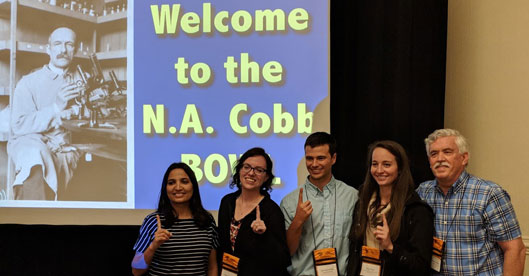
ABOVE: The Nemavengers with the Cobb Bowl moderator, Dr. Eisenback.
Benjamin Waldo received a Bayer travel award to attend the meeting.
Alexandros Dritsoulas received a Corteva travel award to attend the meeting.
![]() REC Graduate Students and Faculty Lead Celebration of Insects Program at Ft. Pierce Botanical Garden
REC Graduate Students and Faculty Lead Celebration of Insects Program at Ft. Pierce Botanical Garden
Nine Entomology & Nematology Ph.D. students from the Florida Medical Entomology Lab (FMEL) in Vero Beach and Indian River Research and Education Center (IRREC) in Ft. Pierce cooperated to present an entomological program for children (6-12y) on the morning of July 6, 2019 at Heathcote Botanical Garden, the site of a former plant nursery in downtown Ft. Pierce that was purchased in the 1980s for development into a botanical garden by a small group of visionary and dedicated residents. In the Spring of 2018, emeritus faculty Phil Lounibos contacted Entomology graduate students at the two RECs on the Treasure Coast towards developing a day program at the Gardens to foment interests in insects among local kids. This led to the first rollout of Celebration of Insects, with about 40 children participating in July 2018 at Heathcote.
Early in 2019 Director Diane Kimes suggested that Heathcote would welcome another program for kids on insects, and many of the same UF/IFAS students who participated in the previous year agreed to a sequel, which took place on the first Saturday of July. Participants from FMEL included Diana Rojas, Rebecca Zimler, Shawna Bellamy, and Tse-Yu Chen, as well as Asst. Prof. Eva Buckner. Volunteering PhD students from IRREC were Kristen Bowers, Kelly Carruthers, Emilie Demard, and Patricia Prade. Other locals contributing to the program were Kate Rotindo from UF/IFAS County Extension; Dr. Joe Patt from the USDA/ARS lab in Ft. Pierce, and Dr. Pat Pongam, a biology faculty member from Indian River State College.
Both years the event took advantage of multiple habitats at Heathcote rich in insect life, such as the Butterfly and Vegetable Gardens and the Citrus Orchard, which were visited by small groups of children led by docents, who collected insects and brought them to the Pavilion, a covered staging area, where observations with magnifiers and microscopes were accomplished before the captured insects were released back to the Gardens.
Among favorable comments received by Heathcote Director Diane Kimes about the event was frequent praise for the sensitive and knowledgeable tutoring from REC graduate students, e.g., Brandy Nelson of Ft. Pierce emailed “our son Caden had such a wonderful time, and we appreciate the opportunity. Tse-Yu Chen was wonderful, and the activities in the pavilion were such fun! Thank you again.”

ABOVE: Tse-Yu Chen, PhD student at FMEL, shows Caden a butterfly captured in the Gardens.
From the Outreach Coordinator
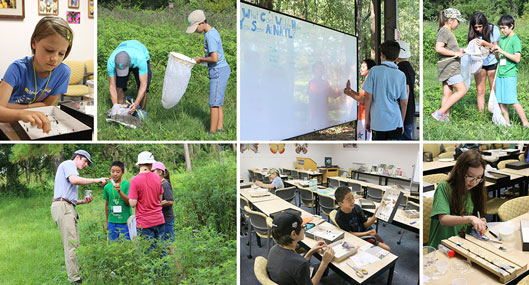
ABOVE: The LepCamp 2019 was a success, with 15 middle school students in attendance, among whom 10 were returning campers from the previous years. Campers continued to perfect their insect collection-making skills. The camp that was started by Dr. Andrei Sourakov four years ago, operates through the Florida Museum of Natural History, and usually takes place at the end of July. This year, Dr. Sourakov was assisted by Matt Standridge, Kristin Rossetti, and Kevin Burnette.
July 9th- Nature Camp: Clayton Bania
July 10th- Fear Facers: Ebony Taylor
July 15th- 4-H bug camp presentation: Clayton Bania
July 15th- CALS tour of Steinmetz: Dr. Rebecca Baldwin
July 16th Cade Museum Bug Camp: Dr. Rebecca Baldwin
July 18th-CPET Workshop- Clayton Bania, Dr. Phil Koehler
July 18th- 4-H Entomology tour: Clayton Bania
August 2nd- Learning Place academy visit: Clayton Bania
August 31st- Childrens Garden Festival: Clayton Bania
The live critters are always a hit with children and adults alike. The critters are available for you to check out should you be leading an outreach event. We have doubles of our most popular critters, as well as various native insect species depending on the time of year. We have large wood and Plexiglas cages for viewing our native orb weaving spiders. There is one travel cage and one larger static cage. Please be sure to contact us and review the protocol on transporting and handling the critters if you are not already familiar with it. If you lead an outreach, be sure to fill out a documentation form so your event can be included in the newsletter and we can log all outreach events.
If you have any questions, please email me.
Thank you —Clayton Bania, Outreach Coordinator.
If you would like to schedule an event or have any outreach questions, go to the Outreach pages on our Bug Club website and contact us.
Getting social!
We have several social media sites for the Entomology & Nematology Department. To make them easily searchable, all three (YouTube, Facebook and Twitter) have the same page name: UFEntomology. Please share these links with past students or colleagues who may have an interest in departmental activities.
Congratulations to Dr Wong for being awarded the BARD (US-Israel Agricultural Research and Development Fund) for $310,000 as the Principal Investigator. He will partner with scientists from The Hebrew University of Jerusalem to develop innovative management strategies for Invasive fruit flies for the next 3 years.
![]() Dr. James P. Cuda was the recipient of $1,500 travel grant from the FAES to attend the annual meeting of the Hatch Multistate Project titled, “Biological Control of Arthropod Pests and Weeds.”
Dr. James P. Cuda was the recipient of $1,500 travel grant from the FAES to attend the annual meeting of the Hatch Multistate Project titled, “Biological Control of Arthropod Pests and Weeds.”
![]() Want grant writing tips? Check out the UF Libraries Grants Management Program!
Want grant writing tips? Check out the UF Libraries Grants Management Program!
The 35th Fume School will take place on November 18th to the 22nd at the FLREC. Registration will open in late August!
![]() Want to stay up to date? Check out our website home page for a link to our Google calendar.
Want to stay up to date? Check out our website home page for a link to our Google calendar.
Dr. Jennifer Gillett-Kaufman is the newsletter editor and does the HTML coding. Issues usually are published by mid-month. Submit items for an issue by the seventh of that month.
We like to share news when it happens using our social media outlets: Twitter, Facebook and YouTube. Follow us on these sites for daily updates! When you send news, we will post it on one or more of these sites and again in the monthly newsletter. Please be sure you have permission from people in photographs you submit for publication.
UF-Bugnews-L listserv subscribers receive notices when issues are posted. Our home page has instructions for subscribing and unsubscribing.
Special thanks to Eleanor Phillips and Dr. Phil Kaufman, who reviewed the newsletter for errors, and to Jane Medley and Don Wasik, who built the web page design.
Give Back
Want to support the UF Entomology & Nematology Department? Consider making an online gift today! Questions can be directed to Christy Chiarelli at (352) 392-1975 or ccw@ufl.edu.